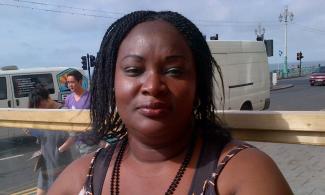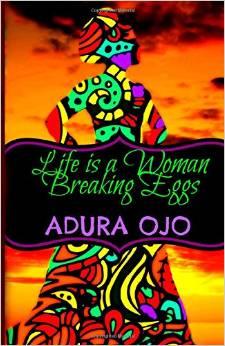
Adura Ojo is a British-Nigerian author, poet, blogger and a mother of two. She is the author of 'Life is a Woman Breaking Eggs' – her debut poetry collection. She is a graduate of English, Law and Social Work. She has worked as a lecturer, trainer and mental health practitioner. Her work is published in Sentinel Champions, Sentinel Nigeria, The Poetic Pinup Revue, and a number of websites. She lives in the UK where she is currently working on her debut novel and a second poetry collection. She spoke to Tundun Adeyemo recently and here is what she had to say.

Why this collection of poetry, why now?
I wanted to do some stocktaking - write about how fragile life is and I wanted to do this from my point of view as a middle aged woman who has lived for a while. ‘Breaking eggs’ is about trauma; it is also about living outside of society’s rules. It could also mean surviving on the margins of society. It can be life affirming as in ‘finding the yolk’ to be your own person or it can really mess up a person’s life The ‘breaking eggs’ experience becomes a marker in one’s life for good or bad. The collection is divided into three sections: Albumen, Yolk and Woman to identify three spheres of human experience from childhood to adulthood. Along with that, there are philosophical themes and ideologies that go into each section.
Has your dad read your collection? What are his thoughts on Dance with my Father?
Unfortunately, my dad is at that stage of dementia where he can no longer read and process thoughts like the average person. Conversation is difficult most days due to memory and thought processing issues. My ‘before dementia’ dad would approve and so will my ‘after dementia’ dad. He is still the same person.
The poem on domestic violence, how personal or otherwise is that? You work on themes and life events, what prompted that poem?
Yes, my poems are based on life events. I ensure that I strip each poem of any characteristics that may link to a particular individual. Some of the poems are also about me. What I’ve done is fuse experiences wherever possible so that the people in my poems and I are one. As a social care professional, I have worked closely with survivors of domestic violence. Women’s issues are close to my heart. That particular poem (‘Girlfriend’) is a montage of survivors whose stories have impacted on me in a profound way.
You use a lot of imagery and everyday words. Was it hard work connecting with your audience?
I’m pleased with the feedback from readers so far. I have an international audience on my blog: ‘Life is a Woman.’ Most of my readers are fiction readers and writers who don’t, usually, read poetry. They tell me that they find my poetry accessible, and that’s why they read it. I’m happy about this because it is one of the reasons I write poetry – to reach those who would not, usually, give poetry the time of day.
Is there a place for African poetry? Would you describe 'Life' as a collection of African poems?
There is definitely a place for African Poetry. There are awards that focus on African Poetry. African poets have a voice. That voice is diverse in its many tongues, but it is also a unique voice.
My debut collection - ‘Life’ - is a reflection of who I am. I have lived across two cultures, and this is reflected in my poems. So a poem like ‘French’ or ‘Keys’ would have a British overtone. ‘Owu Rubutu’ and ‘Sisi’ have an African flavour. Some other poems like ‘Say My Name’ and ‘Eggs Crack Easy’ are distinctly African as they portray the diaspora experience from the point of view of someone who is proud of their African ancestry.
Why should a man buy your book?
‘Life’ is a collection for everyone irrespective of gender. ‘Life’ is about humanity and its challenges, survival, cultural identity and the diaspora experience, and issues of poverty and bad leadership on the continent. These themes are explored from the poet persona’s point of view but that does not make the collection exclusive to women unless we are saying that men do not want to listen to a woman’s opinion on these issues.
Your poems evoke strong feelings. Which of your poem did you write whilst crying or in a broken place?
I have been told this. I’m still speechless when I get that feedback. One of my writer friends said Ojo was the hardest to read as it affected her the most. I had no idea it would come across that way. I would say “The Broom” and “Ojo” were written in emotional spaces that I found difficult to contain. I’m relieved both poems are out of me. XY20 was hard to write too. I edited the poem many times. I was concerned that the person would be dehumanised in some way. It’s a reflective poem about a young man who came to my attention some years ago. I did not work with him, but his story stayed with me for a long time. What happened to him said something profound to me about how fragile our humanity is. I could not graphically describe the actual experience in the poem so I euphemised it as ‘foetal absurdity.’ Writing these experiences out of my head is therapy. It is a therapy that no money can buy.
Who is your audience? Your fan base cuts across nationalities it seems?
My audience is everyone who wants to read the stories and thoughts of real people. My audience cuts across Australia, India, USA, Canada, Nigeria, Ghana, Sierra Leone, Congo, Sweden, Spain and France. And those are the ones that I know.
How did you build this up?
I joined some writing clubs. We had writing challenges and got to know one another on various online writing circuits.
How long have you been writing for?
I’ve been writing since 2004. I penned two columns for the Sunday Independent in Nigeria, as a freelance columnist. ‘London Calling’ and a Romance Series, ‘Tequila Secrets.’
Has this brought you Fame or Money? Neither.
I’m in it for the therapy primarily. Would not mind some money though.

You are also a publisher and an editor, a writer and a blogger. When do you have the time to put family in?
It’s always a challenge. Sometimes I have to be mean with my time, sometimes I’d strongly feel the need to nurture and ditch all roles except mothering. *Smiles*
Tell us about the publishing side of things.
The publishing imprint is Lafia. It is based in London, England. It has an international reach. We are particularly interested in non-fictional or semi-autobiographical life stories. We would also look at poetry and short story collections. But we would consider novellas and novels. We have a lot of flexibility in our author packages. One is bound to find one to suit. Some manuscripts are already in, and the website is not even up yet. It’s an exciting time. Interested parties should email: [email protected]
Where can people find your book online and in hard copy?
Currently, it is on Amazon in Kindle and paperback. We’re working on getting it to other platforms.
Who will you be giving your book to as Christmas present?
My mum
What three books changed your life?
Jane Austen: Pride and Prejudice
Buchi Emecheta: Second Class Citizen
Barack Obama: Dreams From My Father
Poetry or fiction?
Poetry
What is your favourite poem and why?
‘I rise’ by Maya Angelou. It makes me dance and cry at the same time. Joyous tears.
Who is your favourite poet?
Recently deceased US writer Maya Angelou and London-based Somali poet, Warsan Shire.
I can’t choose between the two.
Why should anyone buy your book?
It is an inspiring and refreshing collection of poems. It will make you sing, dance, but also misty eyed. It is a sober reflection on humanity, our country, continent, and the diaspora experience. It is also a reminder of the challenges facing women, a celebration of womanhood and of identity and strength.
Do African writers stand a chance in the UK?
What I see is that we do not support each other. We are very selfish as a community. Everyone is out for just themselves. Take the promotion of my book for instance. People will not even click to ‘like’ the page. It takes just a few seconds to ‘like’ a page or share a status! I’ve had more support from people outside of the Nigerian community. I’ve had fantastic support from my Australian, Indian and American friends than from my own ‘brothers’ and ‘sisters.’ The problem starts with us. We should support each other before we expect others to carry our cross. Charity begins at home.
Tundun Adeyemo